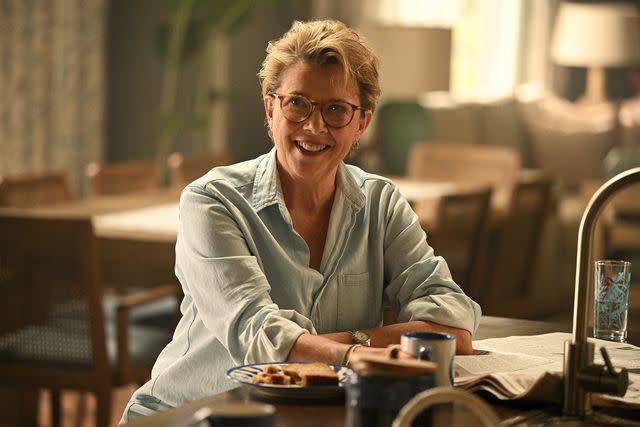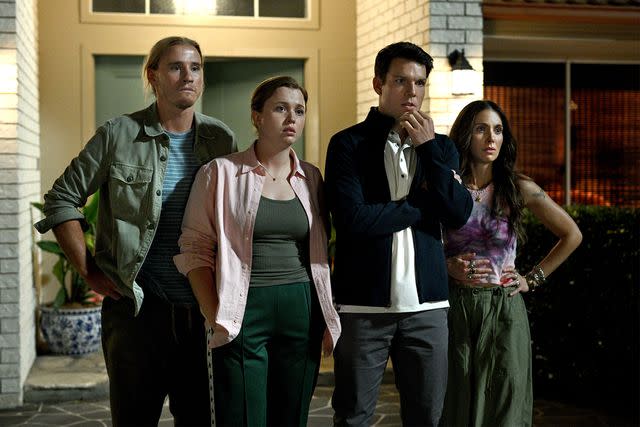“Apples Never Fall” showrunner on why the finale is 'a completely different end' than she had planned
Plus, where the Delaneys and Savannah go from here.
Warning: This article contains spoilers for the Apples Never Fall season 1 finale, "Joy."
For seven episodes, Apples Never Fall introduced viewers to the Delaney family and their many quirks, dramas, and resentments while posing the question: Where is matriarch Joy Delaney, and is she alive or dead?
Episode 7, aptly titled "Joy," finally reveals the answer: Annette Bening's character is very much alive, and, having been fed up with all of the preceding drama and feeling unseen and unappreciated, runs off with Savannah (Georgia Flood) because she wants her family to miss her "for once." Turns out, Savannah has a hideaway cabin in the Georgia mountains and the two go to stay there for a bit, completely off-grid, and Savannah explains her side of the story, revealing that she's tennis star Harry Haddad's long-suffering, forgotten sister.
But when Joy learns of the hurricane back home, she insists on leaving. In the car, the two have it out, with Savannah telling Joy she gave half her family reason to leave, and because of this, she wanted to destroy the Delaney family the way the Delaneys destroyed hers. Savannah crashes the car and escapes, but not before telling an unconscious Joy she forgives her, and she hopes Joy can forgive her, too. Eventually, with Savannah still on the run, Joy makes it back to her family and they all reconcile.
The finale packs in a lot of reveals for the Delaney family, leaves a few questions for viewers to ponder, and is all a bit different from the Liane Moriarty novel of the same name upon which the show is based. Ahead, EW speaks with showrunner Melanie Marnich to answer our burning questions about all of it.

Jasin Boland/PEACOCK
Annette Bening as Joy Delaney in 'Apples Never Fall'ENTERTAINMENT WEEKLY: First of all, how involved was Liane Moriarty — was she available to you as you adapted the series?
MELANIE MARNICH: Liane was great. She's incredibly supportive. She's as present as you want her to be, but she's busy writing her books and was there if we needed, but otherwise, we toodled along and she was there if we needed her.
In the finale, we get this great monologue from Joy, that feels like it sort of explains why she left. What can you tell me about crafting that moment specifically?
Good question. That came about in a drastic rewrite right at the end.
Really?
Yeah, we went on strike, and everything went away. Obviously, I went away with the writers' strike, then the actors shut down, and the minute the writers' strike was over, I was able to look again at that finale. I rewrote a lot of it. I would say 60 percent of it, and it was something I knew I needed to land, the moment in which Joy explains where her life went wrong for her, where as a wife and a mother, you sort of look at that tally sheet of everything you've done and say, oh my God, who is paying attention? Who sees me? Am I invisible? What did I sacrifice for? And she had felt she was a woman who had reached a breaking point. She felt invisible. She felt unseen, unloved, unappreciated, and she made it to this point in her life. She finally retired, and she was like, okay, great. All this sacrifice will pay off in these incredible relationships with my family. And then suddenly they're not there. And she feels bereft and furious. And it just sort of came out. And I think it was interesting as having taken all those months away from the show, then to come back and be able to look at that particular episode with clear eyes. It just felt like it was needed and it was honest.
What other parts of the finale had that radical change whenever you got back to making the show?
The whole end. Yeah. It's a completely different end than I originally had. Completely.
Can you share what you had in mind initially?
It was funny. It was just a matter of having lived with the characters, those actors, the storytelling for months and months and months, and then taking those months away. And then I think having learned from that time on set in looking at what those actors were doing, what was alive, what was real, what was logical, what was emotional, and it just made me go back in to the finale and ask myself, what is the most alive ending possible and what feels the most true to the journey that each of these characters has been on? And true to Joy Delaney. And I think the time that passed was extremely helpful to just let me kind of relax and then come back in and see things clearly, and see what was the most impactful, honest, Delaney-esque ending, and I hope we got there.
Did you ever think about completely deviating from the book and killing off Joy?
No, I never ever wanted that. I never wanted that ever, because what I love about the book is that you make these great assumptions, and then Joy had a completely different experience. I think part of the storytelling is the irony that's achieved with Stan being arrested for the murder of his wife, finding out indeed she left by choice. The circumstances just happened to look a lot like murder. She left by choice, put herself in a situation that she thought was going to be sort of a reprieve or salvation for herself that actually winds up putting her life in jeopardy. She could wind up dead, and he didn't do it, but he's gone away for it. We never considered her dying or being actually killed because it wasn't about that, per se. It was about that this woman goes missing, and there were clues left behind that given who Stan Delaney is, the logical conclusion is that he murdered his wife. And that is a brutal indictment of his character, and that is what he has to face. He thinks he was a good guy. And what is so brutal is that all only resonates if he's not a murderer, and she walks in the door and the family has to contend with the mysteries inside of everybody that came out, the secrets inside everybody. And also the fact that Stan has to face his kids and realize he failed them so profoundly, and his wife, so not killing her was absolutely essential to have this come up and this transformation.
Savannah is the only central character who doesn't get her own episode. Tell me about that choice.
In doing an adaptation, you make some brutal choices. And in the course of the writer's room, there was stuff that we explored with Savannah. There was stuff we explored about every character that didn't make it, and it was either cut in draft form or was cut in editing that was shot. The whole journey of making a show was so humbling because you learn every step of the way. There were these great moments. We had things that I just loved, things we shot, that when we tried to cut them together, derailed that forward momentum of the show. As much as I loved them, as much as they were beautifully acted, everything had to serve the energy of the show. And going into Savannah stuff, we get it through Harry, we get it through solving the mystery of Joy, and solving the mystery of Savannah. We hear about what makes Savannah Savannah, but time out of our narrative, or going a bit sideways to include that, didn't feel right. It felt like the essential motor was the Delaneys. And that Savannah information, when it came out, had to be a part of that story.

Jasin Boland/PEACOCK
Conor Merrigan-Turner as Logan, Essie Randles as Brooke, Jake Lacy as Troy, Alison Brie as Amy in 'Apples Never Fall'What do you think happens to Savannah? Will the Delaneys see her again? Does the law catch up with her?
Oh, she's a nimble one. I think she's going to land on her feet. I think she's going to lay low for a little bit. I do think this experience with the Delaneys was transformative. And when Joy said to her toward the end, "You deserve to be loved," I think there was something healing in that for her. And I think those words will go with her and maybe soften her a little bit. But I do think, a leopard can't change her spots. I think there's something about her that is going to always be troubling.
What about the Delaneys? Where do they go from here?
I mean, that's a really good question. I think the irony of the whole thing is Savannah blowing up the family was necessary if the family was ever going to have a shot. And I feel like now, after the end, they have to learn actually for the first time ever how to be a functioning family in which love isn't a point of competition, and that family is a safe place. And I think it's going to transform the relationships, obviously with their mom and dad. And I think they will — Logan is already doing it with Indira — but I think they all now stand a chance at love.
This interview has been edited for length and clarity.
All episodes of Apples Never Fall are now streaming on Peacock.
Sign up for Entertainment Weekly's free daily newsletter to get breaking TV news, exclusive first looks, recaps, reviews, interviews with your favorite stars, and more.
Related content:
Here are all the biggest changes between the book Apples Never Fall and the Peacock series
Meet the Delaneys, the family at the heart of Apples Never Fall and its (possible) murder mystery
Read the original article on Entertainment Weekly.

 Yahoo News
Yahoo News 
